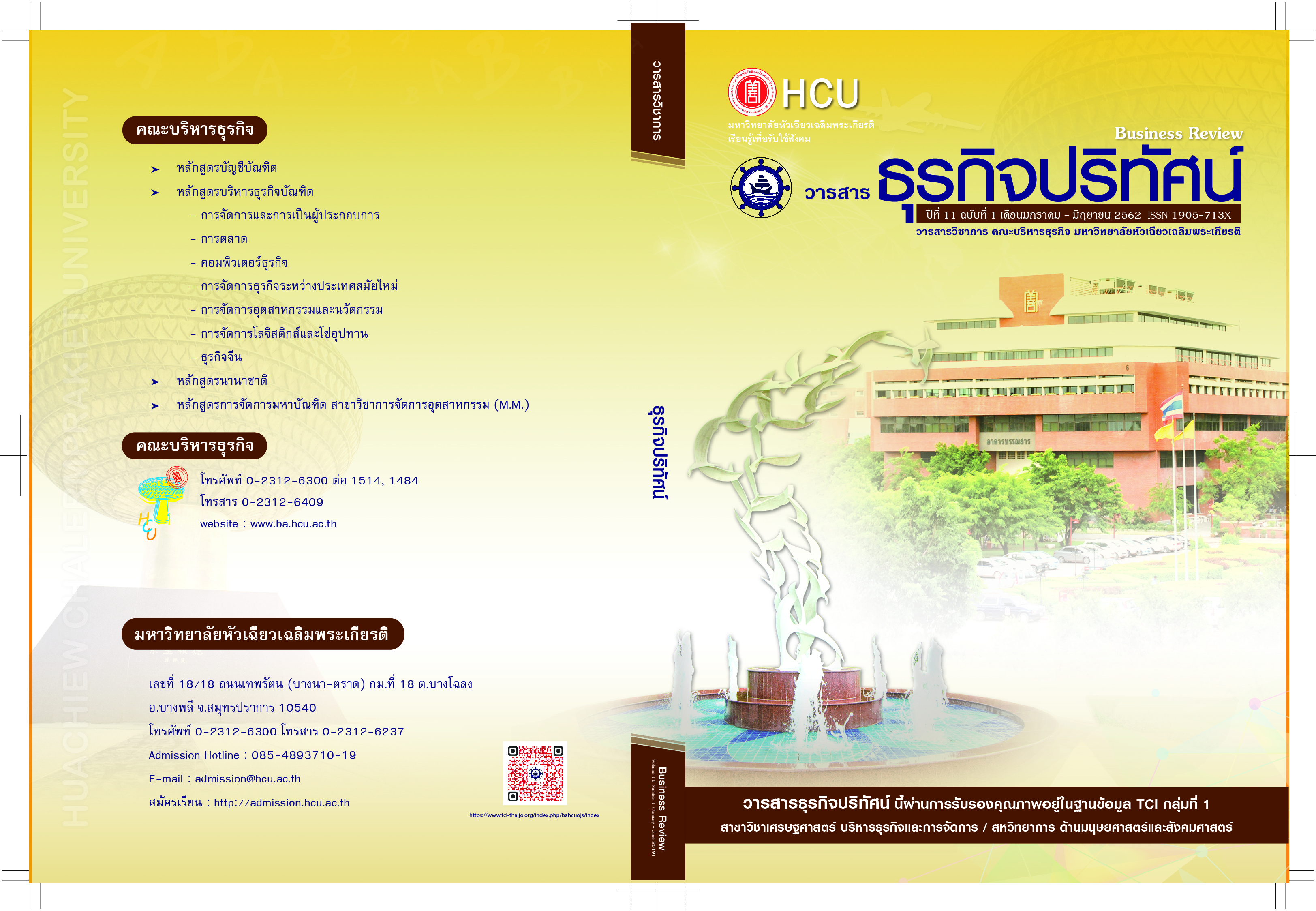Customer Satisfaction towards Service in the Tourism Business Case Study: Your Friends Travel Company, Phitsanulok Province
Keywords:
Customer Satisfaction, Service, Tourism businessAbstract
The purposes of this research were 1) to study customer’s satisfaction towards services
in the tourism business 2) to compare thecustomer’s satisfaction level towards services in the
tourism business, a case study of Your Friends Travel, Phitsanulok Province. It was the quantitative
research. The collected data by questionnaire from 133 consumers of Your Friends Travel at
Phitsanulok Province. The data were analyzed applying by Percentage, Mean, Standard Deviation,
Independent Samples t-test, One way ANOVA. The results of the study found that overall of
consumers at Your Friends Travel were in the highest level satisfaction. When considering their
satisfaction classified by the Service Quality elements, it was found that The level of satisfaction
is also at the highest level in all aspects: empathy, reliability, responsiveness, reliability and
tangibility, respectively. 2) Overall, no significant difference was found in consumers tourism
business satisfaction level with different personal factors at a statistical significance level of 0.05.
References
โรงพิมพ์จุฬาลงกรณ์มหาวิทยาลัย.
กาญจนา ทวินันท์ และ แววมยุรา ค?ำสุข. (2558). คุณภาพการบริการที่ส่งผลต่อความพึงพอใจของลูกค้า
ในธุรกิจการท่องเที่ยวแบบพ?ำนักระยะยาวในการท่องเที่ยวในประเทศไทย. วารสารธุรกิจ
ปริทัศน์, 7(2), 151-167.
ณัฐนุช วณิชย์กูล. (2559). ความพึงพอใจของนักท่องเที่ยวที่มีต่อการให้บริการน?ำเที่ยวเชิงพุทธในประเทศ
ศรีลังกาของบริษัท ทัวร์เอื้องหลวง จ?ำกัด.วารสารกระแสวัฒนธรรม, 17(32), 17–30.
ปฏิภาณ บัณฑุรัตน์. (2553). ปัจจัยที่มีผลต่อความพึงพอใจในด้านการให้บริการของโรงแรมอมารีในเขต
กรุงเทพมหานคร. วิทยานิพนธ์ ศิลปศาสตรมหาบัณฑิต, มหาวิทยาลัยนเรศวร.
รสสุคนธ์ แซ่เฮีย. (2556). ปัจจัยพฤติกรรมการใช้บริการโรงแรม คุณภาพการบริการ ส่วนผสมการตลาด
บริการ และคุณค่าตราสินค้าที่ส่งผลต่อความพึงพอใจของลูกค้าชาวต่างชาติที่ใช้บริการ
โรงแรมระดับห้าดาวแห่งหนึ่งในจังหวัดกรุงเทพมหานคร. หลักสูตรบริหารธุรกิจมหาบัณฑิต,
มหาวิทยาลัยกรุงเทพ.
เลิศพร ภาระสกุล. (2555). พฤติกรรมนักท่องเที่ยว.กรุงเทพฯ: โรงพิมพ์จุฬาลงกรณ์มหาวิทยาลัย.
สมบัติ กาญจนกิจ. (2560). นันทนาการและอุตสาหกรรมท่องเที่ยว. พิมพ์ครั้งที่ 10. กรุงเทพฯ: โรงพิมพ์
จุฬาลงกรณ์มหาวิทยาลัย.
สรชัย พิศาลบุตร. (2551). การวิจัยตลาด. กรุงเทพฯ: วิทยพัฒน์.
สภาอุตสาหกรรมการท่องเที่ยวแห่งประเทศไทย. (2560). รายงานประจ�ำ ปี 2560. สืบค้นเมื่อ 10 ธันวาคม
2561, เว็บไซต์: http://www.thailandtourismcouncil.org
ส?ำนักงานปลัดกระทรวงการท่องเที่ยวและกีฬา. (2558). รายงานภาวะเศรษฐกิจท่องเที่ยว. สืบค้นเมื่อ 10
ธันวาคม 2561, เว็บไซต์: https://www.mots.go.th/ewt_dl_link.php?nid=7533
Chuanchom, J., & Popichit, N. (2014). Key Factors for Success in Business Management of Tourism
Business: A Case Study of Tourism Business in Bangkok Area. SDU Res. J., 10(3), 1-16.
Kerdpitak, C., & Alongkorn, V. (2017). Factors Leading To Success of Tourism Business In Bangkok
Thailand. The Journal of Applied Business Research, 33(3), 501-508.
Kotler, P., & Keller, K. L. (2012). Marketing Management. (14th Edition). Harlow: Pearson Education.
Kuo, N. T., Chang, K. C., Cheng, Y. S., & Lai, C. H. (2013). How Service Quality Affects Customer
Loyalty in the Travel Agency: The Effects of Customer Satisfaction, Service Recovery,
and Perceived Value. Asia Pacific Journal of Tourism Research, 18(7), 803-822.
Likert, R. (1972). Likert Technique for Attitude Measurement. In W. S. Sahakian (Ed.), Social
Psychology: Experimentation, Theory, Research. Scranton, USA: Intext Educational
Publishers.
Osman, Z., & Sentosa, I. (2013). Mediating Effect of Customer Satisfaction on Service Quality and
Customer Loyalty Relationship in Malaysian Rural Tourism. International Journal of
Economics Business and Management Studies, 2(1), 25-37.
Yamane, T. (1973). Statistics: An Introductory Analysis. Third Edition. New York: Harper and Row
Publication.
Downloads
Published
How to Cite
Issue
Section
License
All articles published in the Business Administration and Management Journal Review are copyrighted by the journal.
The views and opinions expressed in each article are solely those of the individual authors and do not represent those of Huachiew Chalermprakiet University or any other faculty members. Each author is fully responsible for the content of their own article. Any errors or issues found are the sole responsibility of the respective author.




